Slack Alternatives for 2025
When it comes to workplace communication, Slack has long been a go-to name. Its channels, threads, and integrations helped redefine how teams collaborate remotely. Yet as work evolves, so do modern teams’ needs.
In 2025, teams are looking for platforms that do more than just chat. They want tools that simplify workflows altogether – support both real-time and async communication, integrate seamlessly with project management apps, and offer flexibility that fits their work approach.
Many Slack alternatives come with built-in features like chat, calls, tasks, and more. In this guide, we’ll break down what to look for, how different tools stack up, and which solutions could be a better fit for your team than Slack in 2025 and beyond.
TL;DR: Slack Alternatives Shortlist
- Discord for voice-first and community-style communication
- Orchestra for messaging with built-in calls, tasks & docs
- Zoom Team Chat for Zoom-centered workflows
- Google Chat for Google-centered workflows
- Chanty for team chat with task tracking
- Mattermost for self-hosted collaboration with that old-school SaaS vibe
- Microsoft Teams for Microsoft-centered workflows
Why Teams Are Seeking Slack Alternatives
Slack is a pioneering communication tool for enterprises and large teams – its complex structure matches theirs, and it offers a ton of features like Slack Connect, Huddles, Threads, Canvas, Lists, and more. That said, there are a few pain points that can make Slack less effective, especially for smaller teams:
The good news is, there are lots of alternatives to Slack that may better match your needs.
Discord vs. Slack
Originally made for the gamedev community and its streaming, Discord has now become a common voice- and video-based collaboration tool among tech teams.
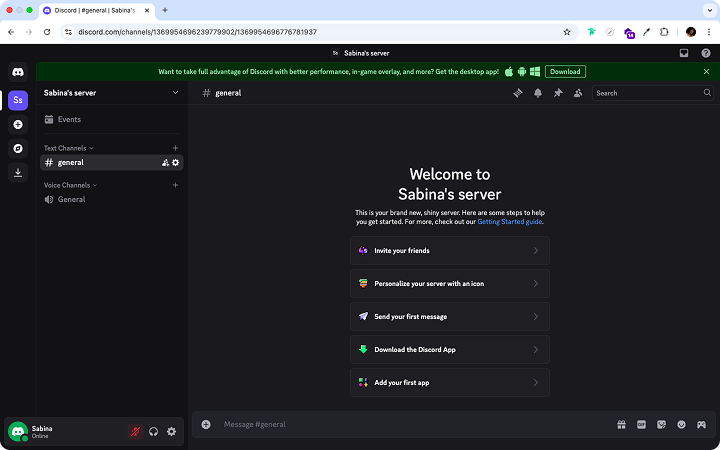
📍Key Features
- Chat Channels. A space for messaging with threaded replies like on Slack.
- Voice Channels. Built-in audio rooms where users can drop in and out freely.
- Video Calls & Streaming. One-on-one or group video calls with built-in screen sharing for live demos, presentations, or collaborative work.
- Custom Roles & Permissions. Fine-tuned control over who can post, moderate, or manage different parts of a server.
- Bots & Integrations. Automation tools, moderation bots, and third-party integrations (like GitHub, Trello, YouTube, and more).
🔎 Compared to Slack
- Pros: Always-available voice channels. Easier ad-hoc communication. Strong community features.
- Cons: Lacks the project management structure needed for tech teams.
👾 Best for Teams
Discord remains a top choice for gamedev communities, as well as creative and remote teams that prefer spontaneous, informal messaging and calls over structured project management.
Orchestra vs. Slack
An all-in-one workspace that brings communication and management as intended – together. Orchestra’s interface is chat-centric, so every project and task has a separate chat to keep your team’s communication on point from the very start.
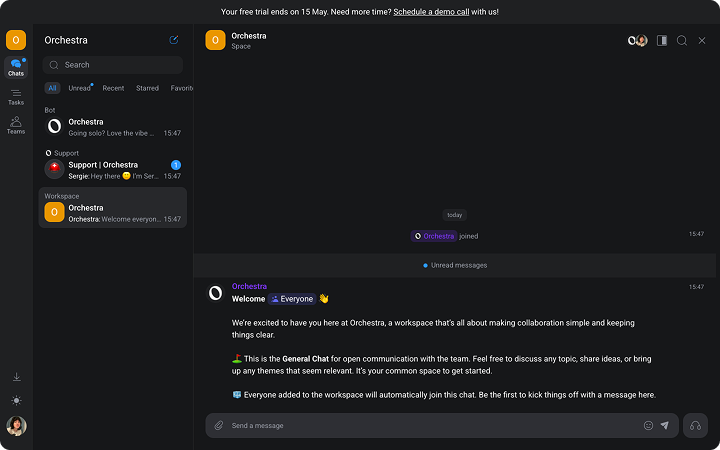
📍Key Features
- Task-focused Chats. Every task or project starts with a dedicated chat, keeping communication on point. Create private or public chats for personal, team, project, or task communication, plus channels for alerts.
- Chat Folders. A cleaner alternative to threads. With folders like favorites, unread, personal, or task-related, shape chat views however you like.
- Built-in Calls. Voice and video calls are already integrated into task-related chats. Recordings are stored within the same chat.
- Built-in Tasks. Projects and tasks can be created directly from chats. Add assignees, deadlines, and structure with hierarchies, lists, and boards — all in one workspace.
- Tasks from Messages. Turn messages into tasks in one click and link them to relevant projects instantly.
- Media & Files. Easy access to docs, media, and files in every chat.
- Teams & Free Guests. Build your team structure with customizable roles and permissions. No limits on external guests.
🔎 Compared to Slack
- Pros: Task-focused workflow. Document collaboration. Unlimited storage and guest access.
- Cons: Less mature integrations (such as Salesforce, Jira, and GitHub).
👾 Best for Teams
Orchestra works best for small and mid-sized modern product, marketing teams, and fast-moving startups. The app is simple yet packed with everything teams need to keep work flowing – easy to use and stylish to work with.
Zoom Team Chat vs. Slack
Formerly a video conferencing app, Zoom has expanded its product lineup and become Zoom Workplace, with Zoom Team Chat as one of its main products.
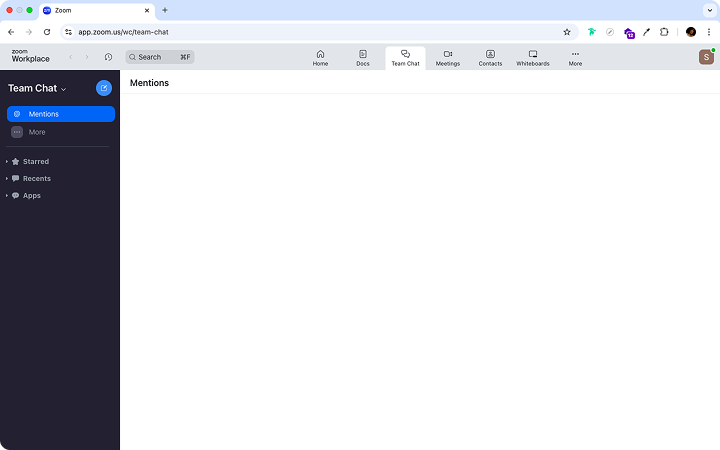
📍Key Features
- Team Chat. A Slack-like interface built inside the Zoom ecosystem. Includes threads, as well as direct and group messaging.
- Meetings. Instant voice and video calls. Create breakout rooms for focused discussions or make async video updates when live meetings aren’t necessary.
- Huddles. Similar to meetings, but more informal and spontaneous.
- Phone. A cloud-based phone service to make and receive calls directly in Zoom, similar to how we used Skype before.
- Calendar. A classic calendar view for scheduling meetings.
- AI Agents. AI-powered chatbots that handle customer inquiries and route issues to the right team.
🔎 Compared to Slack
- Pros: Strong integration between chat and video. Natural extension for Zoom users.
- Cons: Less depth in project management structure. Less async collaboration.
👾 Best for Teams
Zoom Team Chat is a collaboration hub that integrates seamlessly into the Zoom platform, so it’s ideal for teams that are used to the Zoom platform.
Google Chat vs. Slack
Built for teams integrated into the Google Workspace ecosystem, Google Chat allows users to communicate in direct messages or group spaces while collaborating on familiar tools like Docs, Sheets, and Slides.
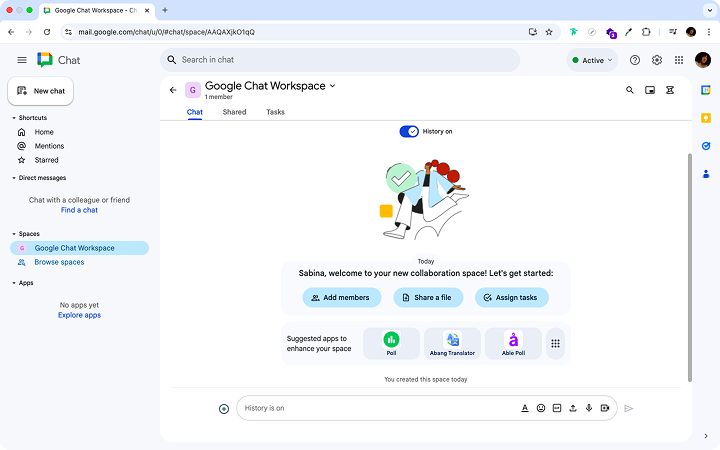
📍Key Features
- Messages & Group Chats. Direct or public chats for discussions.
- Spaces. Threaded conversations, file sharing, and task assignments within each Space.
- Google Workspace Integrations. Additional services like Gmail, Drive, Docs, Sheets, Slides, Meet, and Calendar to collaborate and share work without leaving the chat.
- AI Replies. AI-suggested messages to automate tasks and responses.
🔎 Compared to Slack
- Pros: Integration with Google services. Lower overall cost for Google Workspace users.
- Cons: Fewer native third-party integrations. Limited advanced workflow automation.
👾 Best for Teams
Google Chat is best for teams already using Google Workspace. Teams that focus on document-based collaboration can also consider this tool.
Chanty vs. Slack
A team chat app that combines messaging, task management, and project planning into one tool.
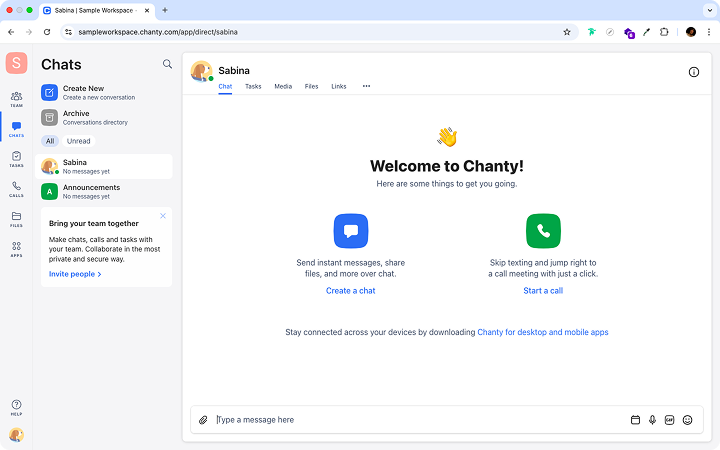
📍Key Features
- Teambook. A central hub where you can find all your messages, tasks, files, and pinned content organized in one place. Threads are also available.
- Chanty Extras. Add-ons like dark mode, a built-in media player, and content previews to improve your work experience.
- Calls. Voice or video calls within the workspace when typing isn’t an option.
- Task Management. A range of tools to work with tasks and manage progress right in the chat.
- Team Space. A shared environment where your whole team can collaborate through chats and tasks.
🔎 Compared to Slack
- Pros: Built-in task features. More budget-friendly while offering similar core functionality.
- Cons: Limited integrations with tools (like Salesforce, Jira, and GitHub). Less polished UI.
👾 Best for Teams
Chanty is a budget-friendly option for small to mid-sized teams seeking a communication tool with built-in basic project and task management.
Mattermost vs. Slack
An open-source team collaboration tool, often viewed as a more utilitarian alternative to Slack, offering similar features along with secure messaging.
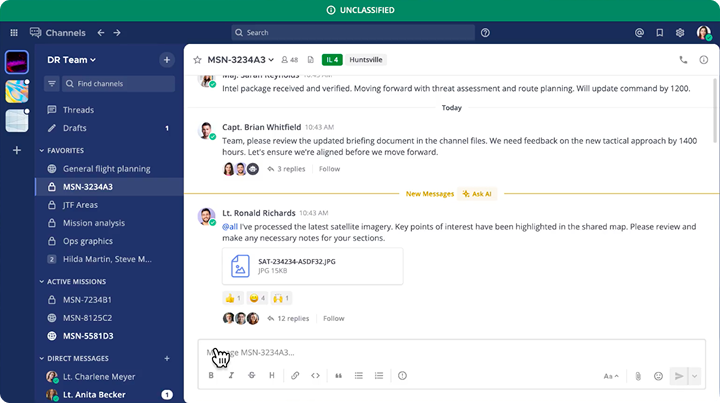
📍Key Features
- Channels. Public or private spaces based on topics, teams, or projects for team communication.
- Threads. The Slack feature to follow specific conversations.
- Customizable Notifications. Tailored notifications to stay updated on important conversations.
- Dev-Centric Integrations. External apps like GitHub, JIRA, Google Drive, and more are connected to your workspace.
🔎 Compared to Slack
- Pros: Open-source means customizable. Developer-friendly integrations.
- Cons: More complex setup. Less polished UI.
👾 Best for Teams
Mattermost is best suited for teams looking for a direct Slack alternative or those needing a self-hosted solution.
Microsoft Teams vs. Slack
A collaboration platform seamlessly integrated with Microsoft 365, designed for teams working within the Microsoft ecosystem.
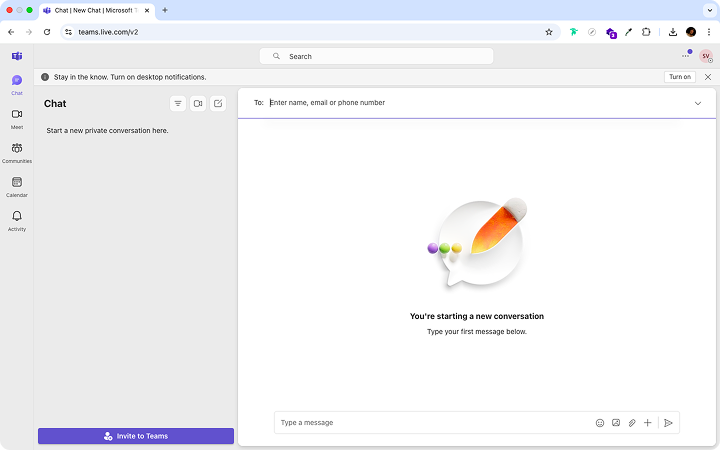
📍Key Features
- Chats. Direct messages with one or more colleagues.
- Channels. You can create them based on any topic. Channels are where all the conversations, files, wikis, and planners are.
- Teams. A space with a list of all the teams you're a part of. They are made up of channels.
- Calls. A cloud-based phone service for calls.
- Meetings. Instant voice and video meetings, just like everywhere else.
- File Collaboration. You can collaborate on Microsoft Docs simultaneously.
🔎 Compared to Slack
- Pros: Integrated with Microsoft 365. Built-in video meetings. Cost-effective for Microsoft users.
- Cons: Heavier app. Less flexibility. Less polished UX.
👾 Best for Teams
Teams that are already using Microsoft 365 and need integration with Office apps will find this option perfect.
Slack Alternatives: The Table View
We’ve rounded up some of the top Slack alternatives for 2025. To help you decide, just focus on the features and the price. The table below should make the research easier:
| # | Key Features |
|---|---|
| Discord | Chat Channels, Calls & Streaming, Custom Roles & Permissions |
| Orchestra | Built-in Chats, Calls, Tasks, One-Click Task Creation, Media & Files, Free Guests |
| Zoom Team Chat | Phone, Meetings, Team Chat, Huddles, Calendar, AI Agents |
| Google Chat | Messages & Group Chats, Spaces, Google Workspace Ecosystem, AI Replies |
| Chanty | Teambook, Chanty Extras, Calls, Task Management, Team Space |
| Mattermost | Channels, Threads, Dev-Centric Integrations |
| Microsoft Teams | Chats, Channels, Teams, Calls, Meetings, File Collaboration |
| # | Pricing |
|---|---|
| Discord | Freemium, Nitro - $10/user/mo, Nitro Classic - $5/user/mo |
| Orchestra | Free Trial, Early Bird - $7/user/mo |
| Zoom Team Chat | Freemium, Pro - $15/user/mo, Business - $21/user/mo |
| Google Chat | Free Trial, Starter - $6/user/mo, Standard - $12/user/mo, Plus – $18/user/mo |
| Chanty | Freemium, Business - $4/user/mo, Enterprise - Custom |
| Mattermost | Freemium, Pro - $10/user/mo, Enterprise - Custom |
| Microsoft Teams | Freemium, Basic - $5/user/mo, Standard - $13/user/mo, Enterprise - Custom |

